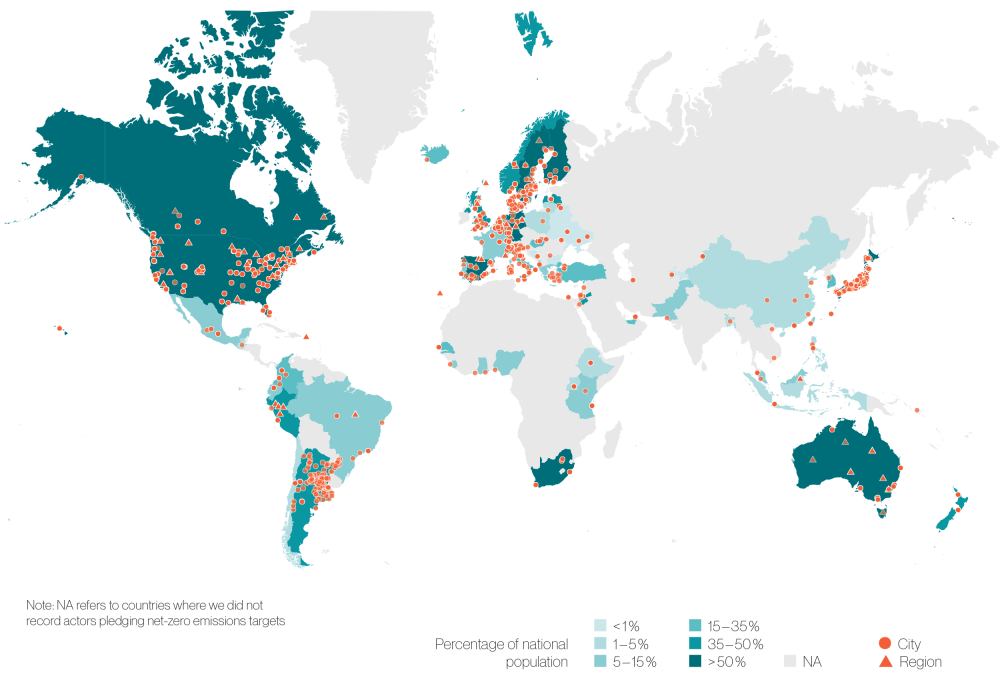A new global stocktake of net zero targets covering 200 countries, 1,000 cities and all Forbes Global 2000 companies has found that while adoption of net zero targets is widespread, many lack substance and short term ambition, leading to greenwashing and marketing deception.
The report, by the Energy and Climate Intelligence Unit (ECIU) and Oxford Net Zero, has found that of the more than 4,000 entities they surveyed, 769 (19%) have established net zero targets. That covers 61% of total emissions, 86% of GDP and 56% of global population.
However, of those with net zero targets, only 60% have set interim targets and 44% have published a plan to achieve those targets. “Which, as #NetZero is in its infancy, are probably decent numbers – but equally they show there’s a way to go”, said ECIU’s founder Richard Black.
On offsetting, an area frequently highlighted in criticisms of net zero targets, the overall takeaway is lack of clarity. We're all aware of companies appearing to rely too heavily on forest offsets – but you can't assess how heavily they're relying if they don't tell you pic.twitter.com/uk9RRBsQU3
— Richard Black (@_richardblack) March 23, 2021
“While the rapid uptake of net zero targets is encouraging, we need much more clarity from actors on how they plan to get there. It’s particularly important that actors clarify their approach to offsetting. ” said another co-author, Dr Thomas Hale from the Blavatnik School of Government, University of Oxford.
The group’s website warns that setting and forgetting net zero targets can lead to greenwashing. “Net zero pledges will only deliver the 1.5°C global warming target if plans are robust and enacted swiftly. Failure to improve commitment to targets with better governance and transparency might leave companies and governments open to greenwashing allegations”.
The report also specifically names Australia as a laggard for not having set a mid-century zero emissions target. “Nations that have not yet set mid-century net zero targets, such as Australia, Russia and the Gulf states, should do so, including through publishing a net zero Long-Term Strategy as requested in the Paris Agreement”.
Out today: We assess the robustness of over 4000 net zero targets:
🌎202 countries
🏙️All 1000+ cities over 500k pop.
🗺️All 800+ regions in 25 highest emitters
💹All Forbes Global 2000 companies769 have a net zero target. But only 149 are 'best in class'.https://t.co/BEkiUyqogv pic.twitter.com/cB7FFpJYrx
— Thomas Hale (@thomasnhale) March 23, 2021
Australia’s Prime Minister Scott Morrison recently expressed a “preference” for achieving net zero emissions prior to 2050, but has not established a plan. However, the number of countries in the world that have set net zero targets but not yet enacted any policies to realise them is high.
This new data shows that if Morrison were to set a net zero by 2050 target, there would be much scrutiny required to ensure that policies were enacted commensurate to that goal. But it also suggests that Morrison would be establishing a net zero target in the context of new tools for assessing, critiquing and gauging the ambition of net zero targets.

With regards to companies, the report finds that only 27% of companies have set targets that includes the full range of emissions, including those from manufacturing products and those from the use of products.
The report comes after a new comment piece by Joeri Rogelj, Oliver Geden, Annette Cowie & Andy Reisinger published in the scientific Journal Nature highlighted a series of questions to assess the quality of net zero targets, suggesting a focus on scope (such as which greenhouse gases are considered), fairness (such as the consequences if the world adopted the target) and the presence and quality of the road map. Both the Nature piece and the new ECIU report highlight an over-reliance on ‘offsets’ and carbon removal instead of rapid, short-term emissions reductions.








